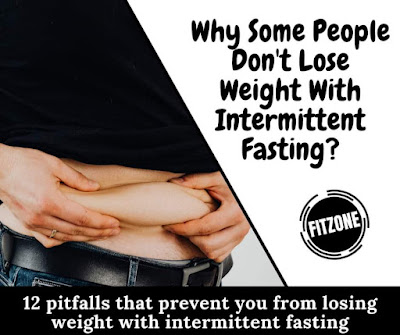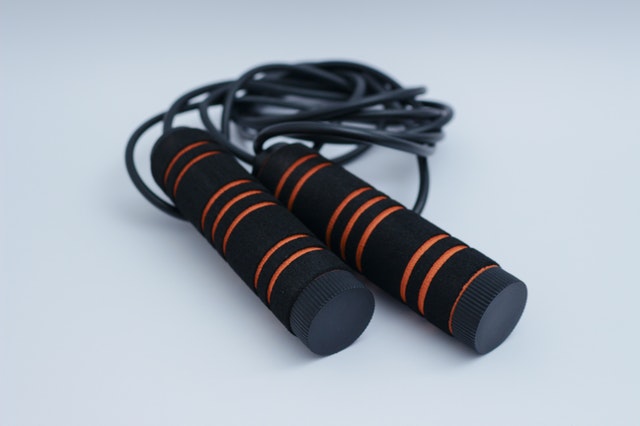Intermittent fasting can be a quick and effective method to break through plateaus and finally reach your ideal weight.
But
due to the lifestyle changes of intermittent fasting, people pay less attention
to basic nutritional principles and do not lose or even gain weight.
Why
can't I lose weight with intermittent fasting ?
If you do intermittent fasting to
lose weight, you are prone to making mistakes. This is because the focus
is placed on the timing of food and less on, for example, the amount and
nutrition of the food.
12 pitfalls that prevent you from losing weight with intermittent fasting
1. You eat too much during your 'eat window'
In
general, your weight is determined by 'calories in vs. calories out'.
If
you eat the same number of calories during the eat window as you ate before
intermittent fasting, you won't lose weight.
The
number of calories is the same. In other words, if you put all your
calories together and eat them in 1 or 2 times, you don't really adjust your
diet at all.
Solution
For
example, try a calorie counter app. This app will tell you approximately
how many calories you will need each day to lose weight.
While
these estimates aren't usually precise, they're a good place to start.
The
app also shows you which meals have more calories than you might
expect. With this information you can adjust your diet if necessary.
2. Since you've been doing intermittent fasting, you've been eating less nutritiously
The
focus of intermittent fasting is mainly on when you eat rather than what you
actually eat.
While
this is emphasized, it doesn't mean you can eat anything you want and still
lose weight.
If
your diet consists largely of high-calorie foods, you probably won't lose
weight.
Solution
Focus
on nutritious meals. These are meals rich in protein, fiber, complex
carbohydrates and healthy fats (Omega 3-6-9).
This
will make you feel full and drastically reduce your calorie intake. Don't
worry, you can still enjoy your favorite meals, but don't do this on a regular
basis.
3. You're not fasting long enough
If
you make the choice to start intermittent fasting and you only shorten your eat
window by an hour, there is a good chance that nothing will happen.
J e
do because your normal eetroutine simply not adapted enough.
Solution
You
don't have to fast for a long time. You can build this up to a longer
fasting period. Men can generally start more easily with a shorter eating
window.
Most
women are successful with a 14-hour fast. You can always start with a
shorter fast and then build on it slowly.
In
short, you build up your fasting window and decrease your eat window.
4. You skip meals during intermittent fasting
Skipping
meals and not eating enough on top of that is not wise.
It
can make you very hungry during intermittent fasting. This increases the
chance that you will break your fast earlier.
Restricting
yourself too much during an eat window can lead to overeating during your
approaching eat window, so that on average you have still consumed more
calories and you do not lose weight.
Solution
Make
sure you're satisfied, but don't overeat yourself during your eat
window. Try to find a balance here. Meal prepping can be a good
idea.
Meal
prepping ensures that you don't overeat yourself, that you don't miss
meals when you're too busy, or when your schedule is unexpectedly changed.
5. You chose the wrong intermittent fasting method
There
are several methods
of intermittent fasting . Not all plans will fit your
lifestyle or boost your specific metabolism.
Imagine
you are training for a run and you have chosen a plan that prevents you from
eating in the morning.
Exactly
the moment when you need fuel for intensive exercise.
As
a result, you will probably deviate from fasting and you may even stop it
completely and it will be at the expense of your sports performance.
Solution
Think
carefully and choose a plan that best suits your lifestyle and is sustainable
for the longer term.
For
a runner, alternating fasts can be a solution so that you don't fast on the
days of intense training. Consider a consultation with a dietitian when
making such a decision that assesses your lifestyle and nutritional
needs.
6. You don't get enough sleep during intermittent fasting
Scientific
research has shown a direct link between weight loss and adequate sleep.
During
sleep, various hormones are produced that aid in fat loss. On average,
people need 7 to 8 hours of sleep per day.
Solution
Understandably,
this isn't feasible for everyone, but aim to get at least 7 hours of sleep
a night .
7. You exercise a lot during intermittent fasting
Often
when people start with a new diet, they also decide to start a new training
schedule at the same time or increase the current training plan.
This
is not a nice combination.
Over training
can cause your energy levels to drop if you try to reduce your food intake and
your hunger levels are skyrocketing.
This
results in a higher calorie intake during your eat window than you burned
during your fasting period, even if you exercised intensively during the
fast.
Solution
When
you fast for full days, do not exercise too intensively. In general, the
training should be challenging, but still manageable and fun. If you don't
feel fit on the days you exercise, you may be pushing yourself a little too
hard. So build it up slowly!
8. You're Not Drinking Enough Water While Fasting
Not
only does not drinking enough water make you dehydrated, but by not drinking
enough water, you miss out on many of the benefits that water can provide, such
as satisfying hunger and eliminating waste.
Solution
Drink
enough! You don't just have to drink plain tap water. Approved drinks
include cold or hot tea, black coffee, coffee or tea with stevia, sports water
(without sugars).
Tip: Did
you also know that intermittent fasting apps have a
water intake tracker?
9. You're not following your plan as instructed
Following an intermittent
fasting schedule can be very difficult because most people are
not used to eating for long periods of time. So if you keep cheating week
in week out, it's not going to work.
You
really need to consider whether fasting is an appropriate idea and takes into
account your lifestyle.
Solution
Choose
an intermittent fasting plan that best suits your lifestyle and that you can
follow for a longer period of time. Take the intermittent fasting schedule quiz to
find the schedule that suits you.
10. You don't make a plan
Planning
ahead is an important conservation aspect for any health
intervention. People have a psychological mechanism that makes you want to
be consistent with yourself. By planning you know what to expect and you
get an extra boost to stick to your schedule.
Solution
Try
to plan all your meals and snacks at least a day in advance. For example,
review a restaurant's menu before dining out. This way you avoid impulsive
decisions .
11. You feel guilty for breaking a fast
Intermittent
fasting takes practice, patience, and willpower. Most individuals who try
it, no matter what approach, will interrupt their fix prematurely at some
point.
If
you're determined to stick with intermittent fasting, it's important that you
don't feel ashamed or angry with yourself.
Solution
It's
important that you don't be too hard on yourself and keep going. Remind
yourself that it takes some trial and error .
Inevitably,
your intermittent fasting schedule won't always go according to
plan. Motivate yourself and try to get back to your normal routine as soon
as possible.
12. Alternate fasting leaves you not eating enough calories on days you don't fast
When
you don't get enough calories on the days that you don't fast, it is possible
that your body goes into a saving mode.
Your
body will then instead of burning the stored calories, store the ingested
calories.
Solution
Make
a feeding schedule for yourself for days that you are not going to
fast. Make an appropriate nutrition plan with balanced meals that consist
of about 300 to 500 calories.








0 Comments